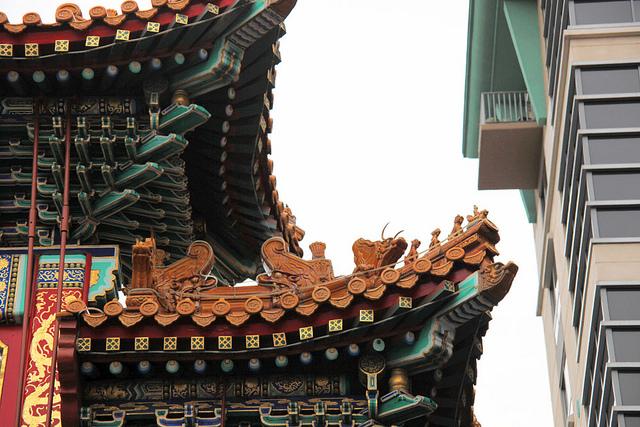Leadership in Asia: don’t count the US out
Posted By Tom Switzer on October 19, 2017 @ 06:00

America, the pundits keep telling us, is failing to exercise leadership in Asia. Crippled by a crisis of confidence and distracted by an erratic and bizarre president, Washington seems adrift and anxious. Add to that ‘a hollowed-out bureaucracy that has been slow to develop and implement strategy’, as the eminent columnist David Ignatius has warned [1], and it’s no wonder doubts are growing about US commitments in the region and elsewhere.
Meanwhile, a rising Beijing is probing US vulnerabilities and testing American resolve in the region. China has emerged from two centuries of weakness and humiliation. It has mastered Western technologies and economic ideas. As a result, many Chinese feel they are finally in a position to command the confidence and credibility that are being showcased at the Communist Party’s national congress this week.
But, to paraphrase Mark Twain, reports of America’s retreat are greatly exaggerated. That’s not to deny that after years of needless and costly wars, US influence in the Persian Gulf is more limited. And in the absence of an overriding strategic threat—Russia is a declining great power—US hegemony in Europe is less necessary than it was during the Cold War. But across most of Asia, there remains a well-founded conviction that the US—even with Donald Trump in the White House—will remain the predominant power in defence, education, innovation and energy self-sufficiency.
Start with defence. Trump has reaffirmed alliances with Japan, South Korea and Australia. So much for being free riders on US security commitments.
What about Trump’s bellicose taunting of North Korean dictator Kim Jong-un? It is fraught with the danger of unintended consequences. But at least the deployment of the advanced missile-defence system known as THAAD reaffirms the decades-old US policy of containment and deterrence in Northeast Asia.
Remember, too, that America has the largest and the world’s most technologically superior military. It spends more on defence than the next 10 or so nations combined. Still not convinced? Then consider this: the most potent form of force projection is the aircraft carrier; the US has 11, while China has only one (a second-hand Ukrainian ship).
True, Trump’s decision to withdraw America from the 12-nation Trans-Pacific Partnership repudiates the US-led world of freer markets and liberal trade. But it’s worth remembering he has not imposed the advertised 45% tariffs on China or the 30% tariffs on Mexico that would have pushed the global economy into recession. Beijing is pitching an alternative to the TPP, the Regional Comprehensive Economic Partnership, but the Chinese regime all too often imposes various regulatory barriers to imports.
Bear also in mind that the US has the world’s most diverse and technologically advanced economy. It remains the issuer of its reserve currency. In the Trump era, too, bullish sentiments prevail; stocks are hitting record highs, and deregulation and company tax cuts are on the legislative agenda.
Much has been made of the displaced white working-class folks from America’s de-industrialised Midwest, who helped make Trump the 45th president. But there are two sides to the kind of creative destruction millions of Americans have experienced. As Joshua Cooper Ramo, author of The seventh sense [2], has observed, there are nine global tech platforms that are used by more than a billion people. (Think Google, Facebook, Microsoft, Apple et al.) All are US companies that dominate their markets.
America has also transformed itself into an energy superpower. How so? Because the shale gas ‘fracking’ revolution means energy self-sufficiency and independence. US states are also investing heavily in green technologies. Yes, Trump pulled the US out of the Paris climate accords, but its carbon emissions are declining dramatically whereas China’s net emissions are still steadily escalating.
Crucially, demographic trends work to America’s advantage: it has moderately high immigration and fertility rates, while China, as the saying goes, will grow old before it grows rich. Even if Beijing can sort out its long-term demographic problems, other big challenges loom: political, ethnic and environmental.
As Professor David Shambaugh, one of the world’s leading China watchers, has argued [3], China’s political system is badly broken and, although Xi Jinping has unprecedented power, his ‘despotism’ is stressing China’s system and society and pushing it towards breaking point.
What does all this mean for Australia?
In recent years, Canberra has taken several positions that tilt in Beijing’s favour: from joining the China-run Asian Infrastructure and Investment Bank, to leasing the Darwin Port to a Chinese company, to failing to follow up America’s seven freedom-of-navigation patrols in two years through the South China Sea. The cumulative impact is that the US might think it can’t rely on Australia for unqualified support in any Sino-American crisis.
On the other hand, the Australian government is increasingly more skeptical about China. Last year it rejected a Chinese bid to buy Australia’s largest electricity network. Earlier this year, it thwarted Beijing’s plans to establish a link between investment in the Northern Territory and the Belt and Road Initiative. And doubts are intensifying over Chinese involvement in our domestic affairs. Meanwhile, polls show [4] that although Australians shy away from Trump, support for the US alliance remains strong.
None of this is surprising. Like much of Asia, Canberra knows that the US is far from acting like a ‘pitiful, helpless giant’, as Richard Nixon famously warned. It remains heavily engaged in the region, and, notwithstanding the doubts and uncertainties about President Trump, the 21st century is likely to remain America’s Pacific century.
Article printed from The Strategist: https://aspistrategist.ru
URL to article: /leadership-in-asia-dont-count-the-us-out/
URLs in this post:
[1] has warned: https://www.washingtonpost.com/opinions/global-opinions/the-real-problem-with-trumps-foreign-policy-plans-he-may-not-have-any/2017/10/10/d8085210-adf3-11e7-be94-fabb0f1e9ffb_story.html?utm_term=.7f84f8dc1dfc
[2] The seventh sense: https://www.amazon.com/Seventh-Sense-Fortune-Survival-Networks/dp/1478909102
[3] has argued: https://www.wsj.com/articles/the-coming-chinese-crack-up-1425659198
[4] polls show: https://www.lowyinstitute.org/the-interpreter/2017-lowy-institute-poll-australians-say-our-global-engagement-and-alliance-us-are
Click here to print.